Bud Mingledorff, Bill Shaw, David McIlwaine, Randy Tice, Tom Weinrich, and Larry Golen.
You’d be hard pressed to create a who’s who of HVACR distribution’s last 30 years and not include these legendary names.
At the 2018 HARDI Annual Conference, Dec. 1-4 in Austin, Texas, these six industry veterans shared decades of distribution acumen during a roundtable discussion that examined the moments that shaped their careers, what they’d change if they were given a mulligan, and more.
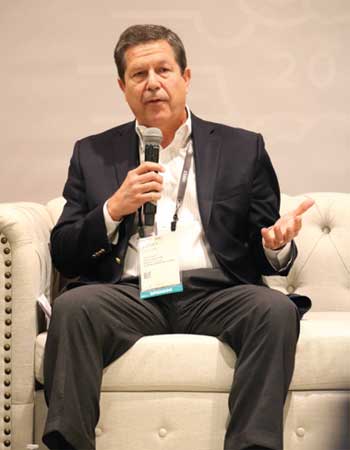
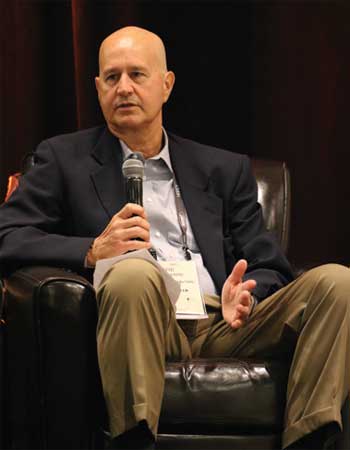
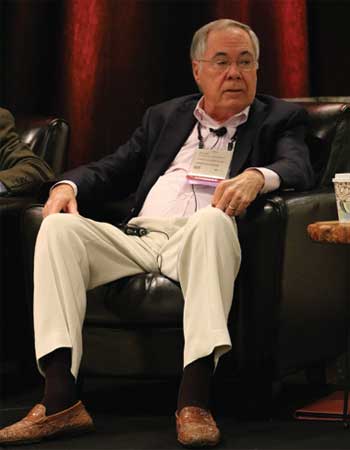
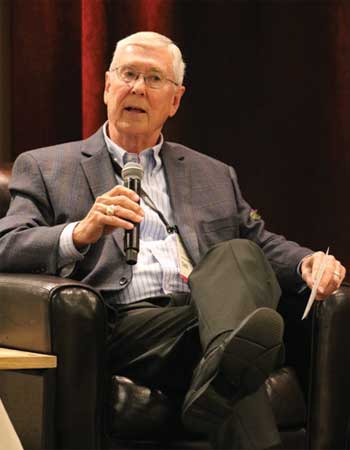
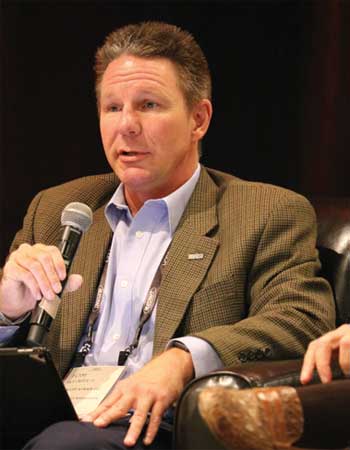
SHARE A BIT ABOUT YOUR BACKGROUND AND HOW YOU GOT INVOLVED IN THE INDUSTRY?
Bill Shaw: Prior to coming to HVAC, I worked for a lady named Mary Kay. When I joined, the business was doing $30 million. When I left, we were doing close to $1 billion.
I elected to leave Mary Kay and buy my own company. I looked at every industry out there. Manufacturing was too capital-intensive. In retail, you lose for all the wrong reasons. I looked at all kinds of wholesale businesses — everything from government screws to high-tech stuff to plumbing. I wound up in HVAC, and I’ve been very blessed. When we started Standard Supply, if there were 25 wholesalers in Dallas, we ranked No. 26. We’re probably 85 percent supplies and 15 percent equipment. I’ve tried for years to get into the equipment business, but I still haven’t figured that out.
David McIlwaine: It was 1976, and I needed a job while on summer break from college. A company by the name of Hajoca Corp., a plumbing and heating wholesaler at the time, hired me. I spent four summers there. When I graduated, I wasn’t sure what I wanted to do. They offered me a job to open a heating department and sent me to train with a retired heating engineer. I spent seven and a half years there. While working there, I commuted to Drexel University at night and got an MBA. I then elected to go out on my own. We started with three people. We bought a building, which is still our main building today. Our business, which is about 60 percent equipment and 40 percent supplies, operates 14 locations and employs 150 people today.
Randy Tice: It feels like I’ve been in this business forever. My dad was a plumbing wholesaler when I was born. He bought the business in 1947, and APR Supply is now in its third generation of ownership. We sell a full line of plumbing, heating, and cooling supplies. Half is heating and cooling, and the other half is pipe valves, fittings, and plumbing.
Bud Mingledorff: I’m a consummate silver spoon kid. In fact, I still have the sterling silver spoon I was given as a kid. Mingledorff’s Inc. started in 1939 as a contracting company in Savannah, Georgia. My father was a mechanical engineer. In 1939, Carrier sold to contractors direct, and we were a contractor-direct purchaser from Carrier. My father and grandfather then went into the shipbuilding business. They took a machine shop from 18 employees to 4,500 employees in a year and a half. In 1945, my father left the shipyard after a fight with his father. He took a dozen of my grandfather’s engineers and his CFO and restarted Mingledorff’s Inc. as a contractor/distributor. In 1958, Carrier forced us into the distribution business. We were running an eight-location contracting company. The distribution business moved to Atlanta, and my father stayed in Savannah. He never worked a day at Mingledorff’s as a distributor. When the company moved to Atlanta, he promoted Ed Eckles, who was the CFO of Mingledorrff’s Inc., to president of the company. I was 12 years old when that happened. At 15, my parents got a divorce. My father sent me to Atlanta. He ended up with custody, and he decided I needed to go to Atlanta to work in the air conditioning business. I worked for Mr. Eckles until he retired. When I got out of the Army, I went to work for Bob Kesterton, who had succeeded Eckles as president of the company. In 1983, I bought the company from my dad using an inheritance from my grandfather. I worked for the president of the company starting in 1983 up until I made myself president in 1995. Today, Mingledorff’s does $480 million in sales — about $80 million in supplies and $350 million in Carrier. The rest of our sales comes from air distribution.
Tom Weinrich: I was born into a family business – a meat processing company that my grandfather, who had a sixth-grade education, started in Casper, Wyoming. At 12 years old, my father shook the corner of my bed at 6 a.m., and that was my first day of work. Working in a family business is not the easiest path. There were numerous times I quit and got fired on the same day. I was being groomed as the third-generation family leader. Unfortunately, at 19, during my first year of college, my parents tragically died. Not having a lot of life insurance, that ended my college career. I became an adult overnight. I left Casper, left the family business behind, and put everything in the rearview mirror. Then, I went to work for the company that I own today. We are part of the Winsupply organization, which, at that time, operated about 55 locations. Today, Winsupply has more than 600 locations. It’s been an exciting 31-year career. We’re about 70 percent equipment and 30 percent supplies. We’ve tried to figure out how to fix that discrepancy, but it is what it is.
Larry Golen: I started my career in manufacturing and was in engineering for a while. I’ve also done some technical marketing, sales, and operations. I’ve been running P&L’s for 25 years. In 2010, I got a call out of the blue to join the industry. I wish I’d found this industry sooner. It’s been a fantastic experience.
IS THERE ONE EVENT IN YOUR CAREER OR ONE PERSON WHO MADE A DIFFERENCE FOR YOU?
Tice: My father. I started in aeronautical engineering and then had to decide what I wanted to do next. He asked, “What about the HVAC industry?” So, that’s what I did. He was instrumental in getting me into this career and getting me involved in NHRAW and HARDI.
Shaw: Bud [Mingledorff] and I had this experience together. He and I attended a presentation from lecturer, teacher, and speaker Ron Foster. Ron shook us up back in those days. He was a crusty, old gentleman, who carried a big cigar in his hand, though he never lit it. He’d throw it at you if you said something stupid, and 90 percent of what was said was stupid. Bud and I kept quiet because he scared us to death. He had some good stuff, and we sat up until 2 a.m. talking about how we can improve our businesses and determining exactly why we are in this business.
Mindgledorff: Ron Foster challenged us to develop a turnaround plan for a business. When we presented our ideas, he threw his cigar against the wall and said, “You people know the problem with Mingledorff’s Inc.? It’s owned by a stupid son of a …” I obviously gave the wrong answer to one of his questions. He physically threw some sales people out of that class. Ron Foster was an interesting guy.
Weinrich: My grandfather and father. They showed me how important it is to invest in our customers. People buy from people. I’m not discounting the Amazons of the world, but we have relationships with our customers, and we invest emotionally in them. We help them through the difficult times. We understand they sign our paychecks. Without their success, we have zero chance.
Golen: In the early 1980s, I was a new sales manager, and I was out with our sales guys. We stopped into a customer’s location, and one of our guys launched into this diatribe on one of our new products. The customer sat and listened, and when he was done, he said, “Congratulations, I couldn’t care less about what you just said.” Be a student of your customers and know what they care about. That struck a note. Determine in advance why customers should buy from you. What is it about you that’s compelling? If you can’t come up with those answers, they certainly can’t.
McIlwaine: While working at Hajoca at the age of 24 or so, I attended a sales training class called “I’m a Tiger.” It was during this course that it clicked for me that sales is a competition. The presenter gave us an assignment: go visit a customer and sell him something. The next day, we reported back. He asked, “Did the customer buy?” I said, “No.” He responded, “So, what you’re telling me is that you just weren’t good enough?” I said, “No, there was this and that, etc.” He replied, “No. The other guy was better than you.” He kept repeating himself until I finally saw his point. Sales is about competing and winning. The light went off. I started looking at everything in a completely different light. That forever changed how I approached sales.
KNOWING WHAT YOU KNOW NOW, WHAT WOULD YOU TELL YOUR YOUNGER SELF?
Golen: Listen, learn, and conduct yourself with respect and humility. Make sure you understand what matters to your customers. Look yourself in the mirror everyday and ask, “Whatever I did, was it good enough?” Challenge yourself to be better every day.
Shaw: In business, you’re either growing or you’re dying. There’s no such thing as standing still. I said to my wife, “I think I want to be cremated when I’m done.” Two days later, she said, “I’ll make you an appointment for next Thursday.” You have to be careful what you wish for.
Weinrich: Relationships need to be based upon trust. Contractors share intimate details of their businesses with me because they’re confident that information will not be shared with anyone else. I’m willing to sit down and look at P&L balance sheets and give suggestions because I have industry knowledge they don’t. My goal is to help them be successful.
Mingledorff: I was lousy at school. That changed when I came out of the Army. I decided I was going to study everything. When I got engaged to my bride of almost 40 years, I studied what it was like to be married. I bought cassette tapes and listened to them during my windshield time. When we became parents, I studied what it was like to be a great parent. When I was buying a company, I studied. Through this process, I learned that life revolves around how you interact with people. The one thing everyone wants is to feel significant and appreciated. Gratitude is the least felt human emotion.
We were in some podunk town in Georgia, and eight Marines in fatigues were eating in this restaurant. I told the waitress, “I want to buy everyone lunch at that table.” I told her I’d tip her well if she went and picked up their tickets. She walked over there and said, “Gentleman, hold your tickets in the air. An appreciative customer wants to buy your lunch and remain anonymous.” The people sitting next to the Marines started clapping. Soon, the entire restaurant gave the soldiers a standing ovation.
I looked over and my customer had tears running down his cheeks. He was a Vietnam vet. I didn’t know that at the time. Simply telling someone they’re the greatest is an amazing thing. Be the person that fills that space today. DT
Publication date: 2/25/2019
Want more HVAC industry news and information? Join The NEWS on Facebook, Twitter, and LinkedIn today!



Report Abusive Comment